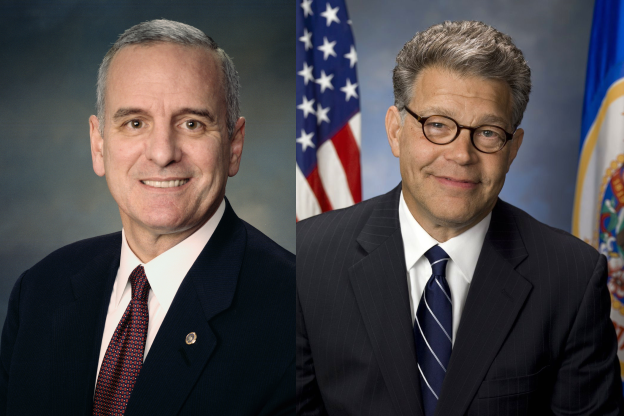
Two new polls paint different pictures of Minnesota races
Two new polls of the two big races in Minnesota this fall have come out, well, one of the polls is from last week and I’ve just now come around to write about it. So it’s new to these electronic not-pages. I’ll start on the Gubernatorial side and begin with the most recent poll from PPP.
PPP (6/17, 10/31/13 in parenthesis):
Mark Dayton (D-inc) 47 (48)
Kurt Zellers (R) 37 (38)
Not Sure 16 (14)Mark Dayton (D-inc) 47 (48)
Jeff Johnson (R) 36 (37)
Not Sure 16 (15)Mark Dayton (D-inc) 47 (48)
Marty Seifert (R) 36 (37)
Not Sure 17 (16)Mark Dayton (D-inc) 47 (48)
Scott Honour (R) 35 (38)
Not Sure 19 (15)
(MoE: ±3.9%)
The way PPP sees it nothing has changed in the eight months since they were last in the field in Minnesota. SurveyUSA, on the other hand, sees things differently.
SurveyUSA (6/10, 2/28 in parenthesis):
Mark Dayton (D-inc) 46 (52)
Kurt Zellers (R) 39 (31)
Hannah Nicollet (IP) 6
Other 3
Undecided 5 (16)Mark Dayton (D-inc) 46 (52)
Jeff Johnson (R) 40 (34)
Hannah Nicollet (IP) 5
Other 2
Undecided 6 (14)Mark Dayton (D-inc) 46 (51)
Marty Seifert (R) 38 (34)
Hannah Nicollet (IP) 7
Other 3
Undecided 6 (15)Mark Dayton (D-inc) 47 (53)
Scott Honour (R) 37 (33)
Hannah Nicollet (IP) 7
Other 3
Undecided 6 (14)
(MoE: ±3.1%)
The way SurveyUSA sees things Mark Dayton has experienced an across the board dip in support, losing roughly five points while his opponents gained about the same.
PPP sees no change and SurveyUSA sees a rather large change, how do we merge these two conflicting views of the race?
Partly the change can be explained by differences in the sample; PPP managed to get almost the same partisan breakdown in their more recent poll as they had in their poll from last October, while SurveyUSA’s more recent poll is six points more favorable to the GOP than their previous poll.
Another difference between the two SurveyUSA polls is that the more recent survey used a likely voter screen while their previous one did not.
SurveyUSA interviewed 2,200 state of Minnesota adults 06/05/14 through 06/09/14. Of the adults, 2,032 were registered to vote. Of the registered, 1,017 were determined by SurveyUSA to be likely to vote in the 11/04/14 general election, 404 were determined to be likely to vote in the 08/12/14 primary election.
These two things can certainly explain some of the softening of support seen by SurveyUSA, but I don’t think that’s the whole story. If those were the reasons for Dayton’s apparent drop in support, than we would have expected to see a similar drop for Al Franken. Instead:
SurveyUSA (6/10, 2/28 in parenthesis):
Al Franken (D-inc) 48 (50)
Mike McFadden (R) 42 (40)
Kevin Terrell (IP) 6
Other 3
Undecided 5 (11)Al Franken (D-inc) 48 (49)
Jim Abler (R) 39 (37)
Kevin Terrell (IP) 7
Other 3
Undecided 6 (14)
(MoE: ±3.1%)
Al Franken dropped a few points against both opponents, but not the double digits that Dayton dropped.
Before moving on, here are PPP’s results for Al Franken, which like their results in the Governor’s race show stasis:
PPP (6/17, 10/31/13 in parenthesis):
Al Franken (D-inc) 49 (49)
Mike McFadden (R) 38 (38)
Not Sure 13 (13)Al Franken (D-inc) 50 (50)
Jim Abler (R) 39 (39)
Not Sure 13 (11)
(MoE: ±3.9%)
In the case of Al Franken, both polls agree that there has been very little movement. In the case of Mark Dayton though, there is disagreement on this point.
The cause of that disagreement it appears is that in their March poll, SurveyUSA found a decent number of Republicans who either supported Dayton, or were undecided. In the March poll Dayton was getting between 19% and 14% of self-identified Republicans for an average of 17% support while his named opponents were getting between 70% and 62% with an average of 67%.
Al Franken, on the other hand, was getting between 17% and 13% for an average of 14%, while the named Republicans were getting between 77% and 75% for an average of 76% support. That’s a 62 point spread for Franken and only a 50 point spread for Dayton. In the recent SurveyUSA poll, the breakdown among Republicans is virtually identical between the two candidates.
It’s unlikely that Dayton was going to receive the level of support among Republicans that SurveyUSA found in March, and it may just be that their survey then was too optimistic rather than that anything has fundamentally changed about the race.
Thanks for your feedback. If we like what you have to say, it may appear in a future post of reader reactions.


